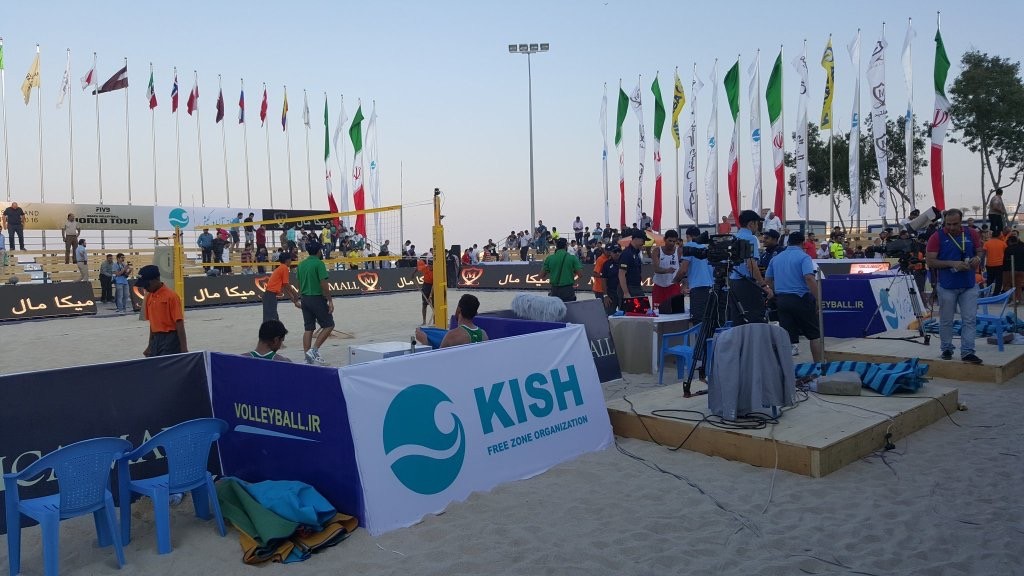Local Authorities Defy Iran’s Commitment to Federation and Refuse to Allow Women at Volleyball Match

Despite assurances by Iranian authorities that they would comply with international rules and allow women to attend the Beach Volleyball World Championship on Kish Island, women are being turned away.
Following refusal of authorities to allow female spectators to attend the Championship matches in Kish Island in southern Iran, a source at the Iranian Volleyball Federation told the International Campaign for Human Rights in Iran that most likely the local authorities have acted arbitrarily and of their own accord in turning the women away.
“The Iranian Volleyball Federation had aimed to satisfy the International Volleyball Federation’s requirements pertaining to allowing female spectators in the Kish Free Zone,” the source told the Campaign. “The issue will most likely be reviewed at the Iranian Volleyball Federation over the coming days, the source added.”
Before the start of the championship, the head of Iran’s Volleyball Federation, Mohammad Reza Davarzani, assured people that the relatives and guests of team members would be allowed to watch the events from the stands—implying that women would also be allowed to attend.
The International Volleyball Federation only agreed with Iran’s request to host the event after receiving assurances that female fans would not be banned from the event.
The semi-official Iranian Student News Agency (ISNA) had quoted a communications director at the World Volleyball Federation on February 7, 2016, saying: “We have received guarantees from the Iranian organizers of the Beach Volleyball World Tour that anyone, regardless of gender or age, would be able to watch the games.”
But on the opening day of the five-day event at the popular vacation destination of Kish Island, on February 15, 2016, women were not allowed to sit in the stands.
A sports writer told the Campaign that according to eyewitnesses, some women watched the matches and took photos from the rooftop of a nearby coffee shop after being stopped from entering the event center.
Volleyball is the only men’s sport Iranian women have occasionally been allowed to watch from arena stands in Iran. Even though an order to ban women from watching all men’s matches has been strictly enforced in the past three years, women’s groups have been working hard to reverse it.
The last organized protest against the ban took place during the Volleyball World League matches in Tehran in June 2015 when 481 civil activists wrote to the Interior Minister calling for an end to the ban. But female fans were again barred from the 12,000-seat Azadi Arena on June 13, 2015.
A year earlier, on June 20, 2014, a larger number of women were also stopped from entering the arena, including Sara Ghassempour, the director of President Hassan Rouhani’s Working Group for Girls.
Ghassempour’s attempts to persuade police officials to allow women through did not resolve the standoff, and during the third encounter with female fans on June 20, 2014 the police resorted to violence and beat up several protesters, including a female reporter from the Shargh daily newspaper, Fatemeh Jamalpour.
Five days later, Ghoncheh Ghavami, a British-Iranian dual national, was arrested for trying to enter the Azadi stadium to watch a volleyball match between Iran and Italy. She was sentenced to a year in prison for “propaganda against the state” but was released after six months.
The Rouhani government’s position has been generally supportive of the presence of women at sport events, but the administration has not expended any political capital to try to make it happen.
The demand for attending the match between Iran and the U.S. volleyball team in Tehran on June 19, 2015 was particularly high due to the government’s initial support, but no women were allowed into the arena, not even female members of the press.
At the time Rouhani’s Vice President for Women’s and Family Affairs, Shahindokht Mowlaverdi, admitted that the government was not able to fulfill its promise to open the arena’s doors to women due to objections raised by a number of senior clerics.
Radical groups, including Ansar Hezbollah, a shadowy semi-official group known for its physical attacks against citizens who question ultra-conservative dictates, have also warned of “bloody” consequences if the government removes restrictions on female fans attending sports matches.






